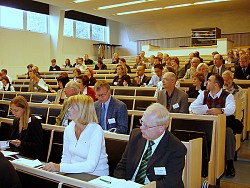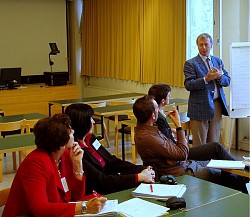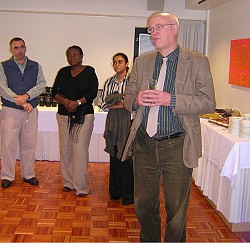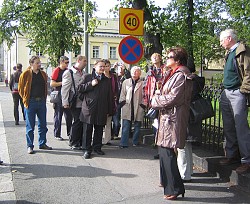Commission 9 Seminar on Compulsory purchase and compensation
in land acquisition and takings
Helsinki, Finland, 6-8 September 2007
|

Commission 9 seminar at the Helsinki Technical
University. |

Dr.
Paul Munro-Faure, FAO at a workshop during
Commission 9 seminar in Helsinki. |
This seminar has been organised by FIG Commission 9 - Valuation and
Management of Real Estate, in conjunction to the Baltic Valuation Conference
and with the FIG Commissions 7 - Cadastre and Land Management, and 8 -
Spatial Planning and Development.
The major goal of the meeting was to intensify the discussion between
valuers, surveyors, real estate experts, financiers, urban planners,
researchers, teachers and decision makers and develop common ideas for
shaping the future. The seminar was very active with about 120 participants
from 35 countries.
Objectives
Compulsory purchase (expropriation) is an important tool in most of
countries for land acquisition for public purposes although in many
countries land acquisition can often be arranged trough other means, e.g. by
voluntary agreements. In recent years the discussion of the use of
compulsory purchase has been rather limited. It is not known what kind of
new legislation, practises and methods for valuation of compensations has
been adopted and how well they function. Also the old methods and procedures
might have been ineffective or unpopular. To find out the present situation
and potential for new good practices the seminar concentrated to the
following objectives:
- to identify the legal structures and practices in compulsory
purchase and compensation in different countries,
- to study if the compensation statutes, valuation methods and manners
will lead to full and just compensation and identify possible
shortcomings, and
- to find possible and effective solutions to solve the problems
especially for developing countries. What are the best practices and
what principles should be taken into consideration or should be avoided.
The seminar
FIG President Prof Stig Enemark and the Finnish Minister of
Housing Jan Vapaavuori gave welcome addresses. Prof Rachelle
Alterman gave the keynote presentation about the legitimate purposes to
expropriation. During the seminar the focus was on expropriation systems and
the need for alternatives, compensation, quality management of expropriation
processes, the protection of property rights, uncertainty of valuation, pro
poor approaches to compensation and expropriation in developing countries,
human rights perspective, history and development of expropriation. A lot of
attention has been given to the Background and Context for the FAO/World
Bank Initiative on Compulsory Purchase and Compensation. Finally there was
attention to some special themes and cases from specific regions, such as:
can I bore a tunnel under your house? Or: does land expropriation support
innovative procurement in road projects?
The presentations can be found from the seminar website.
Workshop
Many opinions were presented during the workshop. Concerning the
procedure of expropriation it can be observed that, from the perspective of
the acquiring authorities there is a need for a speedy timeframe, low costs
process for compensation, avoidance of external costs of expropriation, and:
there should be sufficient resources for expropriation.
On the other side, from the perspective of affected occupants, users,
owners there is a need for: transparency and information, avoidance of
expropriation (generally - it has to be absolutely necessary), a proper
planning and negotiation process and a fair compensation.
Those issues are also relevant for foreign investors. Further the
interests of women/men, landlords/tenants, formal/informal and indigenous
and customary have to be recognised; resettlement can be an option in
certain situations, if possible to be combined with rights to return.
Technical expertise is required an decent salaries are important to avoid
undesirable situations when professionals are concerned.
All this can be supported by: provision of technical expertise,
development of guidelines on particular issues, expropriation-related land
tools: e.g. better planning processes, compensation, enumeration, conflict
resolution. And, more specific, by providing resources for acquisition,
availability of sufficient professionals, advocacy support, legal support
and international (& national) complaint mechanisms. Training remains a key
issue.
When assessments and compensations come into the process there is a need
for uniformity based on (international) standards. Transparency, equity and
free public access to property sales information are a basis for success. It
should be considered to increase the amount for compensation well above any
form of market value to achieve a quick acquisition process and to avoid
wasting time and money on lengthy negotiations, the state should even have a
limited time to agree on compensation - if the state cannot agree
compensation in that time frame the state should loose the right to acquire
the land.
When standardisation comes in it is most relevant to provide a single
definition for the term of value - which countries can amend for their
purposes as appropriate. Where the cooperation FIG/FAO is concerned ´best
practices´ should be analysed to understand the valuation and compensation
processes. It was suggested to establish an international committee of
experts to advise countries with specific problems. Guidelines should be on
the necessary skills and support organisations to develop skills and
capacity as well as relevant standards for compensation, assessment
definition and procedures. The need for an authorising or licensing system
for specialist valuers and other experts was discussed as well as the
creation of independent and liable professional bodies to inform all
parties. Mediation works well in practise, appeals could be skipped. Land
owners should have a choice between resettlement or financial compensation,
nominal values should be used.
Conclusion
The contents of the presentations and the opinions presented during the
workshop form a solid basis for future developments – in co-operation with
the FAO and the World Bank.
Kauko Viitanen
Chair of FIG Commission 9 - Valuation and the Management of Real Estate
|

Mr.
Jarmo Ratia, Director General of the Finnish National
Land Survey making his welcome address at the reception. |

Excursion to Helsinki.
|
|


























